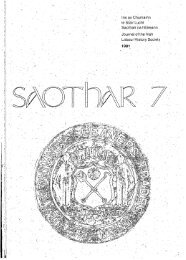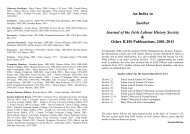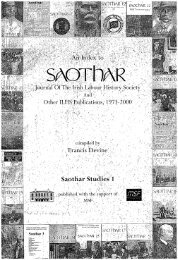72 SAOTHAR 13strength. 40But while a decline in the popularity of whiskey drinking and general drunkenness was noted bymany visitors and commissioners in this period, the problem of drunkenness in Ireland was by no meansresolved. Many thousands remained unmoved by the crusade, while the resolutions of others were alltoo short-lived. 41 Nor should all the responsiblityfor the reported decline in alcoholic consumption beattributed to the endeavours ofEdgar and Mathew. The introduction of revenue police and the reductionof duty on whiskey were undoubtedly significant factors in reducing the number of 'shebeens' and thelocal customs and festivities which surrounded them, while the increased supervision of 'improving'landlords and their agents was a further effective deterrent. 42 Evangelicalism with its network ofaristocracy, gentry and clergy, exercised considerable social influence, provided an organisationalstructure, and offered an alternative sub-culture; but it was also a beneficiary of more specificallysecular trends. Outside the polemics of religious reformers, the temperance movement can be seen morerealistically as part of a wider process of adjustment to socio-economic trends. Illicit distillation andlarge scale alcoholism were only one aspect of the Irish culture which was giving way to more legitimateand socially acceptable modes of behaviour. Visits to Holy wells, the custom of the Irish cry,cockfighting, card-playing and dancing were in decline,43 not only because of the vigilance of bothCatholic and Protestant clergy, but because of the increasing pressures on time and money as the declineof the linen industry forced many rural dwellers to concentrate their energies on farming, while rapidurbanisation changed the lifestyle of the town population. 44 Evangelicalism was thus both the agentand the beneficiary of other changes in the Ulster economy and society in this period.In an increasingly pluralistic and secular society, it was recognised that to engage successfully incompetition with popular cultural activities it was necessary to provide not only morally, but sociallyacceptable alternatives. The success of the temperance movements - Catholic and Protestant -depended largely on their creation of alternative social outlets to the pubs or drinking houses byproviding an opportunity for social intercourse and recreational diversion, through tea drinking,reading rooms, and participation in bands, dances and processions. 45 Similarly, the formation of YoungMens' Clubs, Ladies' Societies and Children's classes reflect the churches' endeavours to provide forall, and to bind the inhabitants of a locality into a unified group with a sense of religious identity .. Theleisure time of the masses thus became contested territory.46The Reverend William Magee, speaking on behalf of the Association for Discountenancing Viceand Promoting the Knowledge and Practice of the Christian Religion, noted the popularity of storybooks and ballads among the working classes. 47 He determined to utilise this literary form byintroducing 'under the garb of fable' the virtues of honesty, sobriety, industry, cleanliness andsubmission to the law. Tract distribution thus became a popular aspect of religious propaganda, theeffectiveness of which, however, is difficult to assess. The cheap and readily available reading materialsupplied religious explanations for poverty and distress, and sought to raise the religious and moralsentiments of the poor to a level beyond the excesses of drink and gambling in which so many soughtcomfort. The titles of some of these publications suggest both the vulnerability of those to whom they.were addressed, and the perceived urgency of the gospel message:The Danger of Delay, TheImportance of Sobriety, Honesty is the Best Policy, The Surest and Safest Way of Living. 48 The extentof their success in competing with ballads, or with the cheap 'penny dreadfuls' which flooded thepopular market in the 1830s and 1840s is unclear. J.R.R. Adams, speaking of the Belfast ReligiousTract Society formed in 1815, suggests that 'in view of the large numbers of titles published thedistribution must have been large' .49 That the tracts were actually read and their contents digested, doesnot necessarily follow. Even the most sanguine of tract distribu tors were unable to recount many talesof popular behaviour being radically changed by an encounter with a tract without other kinds ofpersonal support and influence.The relation between the essentially 'religous' and 'traditional' aspects of popular culture is, ofcourse, complex. The two were never completely separate, but interacted and merged at many points,particularly during the ritualised highlights of the personal and social calendar, o'{er which the church
ESSAYS 73claimed authority but which reached deep into folk history - birth, death, marriage, Easter andChristmas. 5o There was often a good deal of tension between clerical and popular attitudes to thecelebration of these occasions. Easter Monday outings to Cavehill with drinking, dancing, eating andsinging, for example, were the despair of religious leaders,51 but when Thomas Drew, the energeticcurate of Christ Church in Belfast, and other Sunday school managers set out to promote a 'moraloption' , they wisely compromised by investing their religious celebrations with all the noise and colourof more traditional festivities. 52 Sunday school anniversaries and the opening of new churches werealso celebrated in this way in an attempt to offer a lively alternative to the temptations of the new age.The process of modernisation - in the shape of cheap Sunday railway excursions, for example -prompted a vigilance more suggestive of the urgency of the campaign than of its success. 53It is already clear that, despite evangelical intentions and claims, a series of compromises and mutualaccommodations was a greater actuality than the supposed imposition of a code of behaviour on anunwilling but passive section of society. The interaction between religious expression and secular lifecan most clearly be seen in the emergence of 'respectability' as a central feature in the Protestantculture. 54 The desire for upward mobility on the part of the working classes is too often overlooked asan explanation for the encroachment of evangelical principles on popular culture. For many UlsterProtestants the temporal advantages of moral elevation were self-evident and personal ambitions werejustified by the Puritan idea that worldly position was a reflection of divine approbation. 55 Religion andrespectability were thus mutually reinforcing, and divisions between classes were perhaps less distinctthan those between types of social behaviour and values which cut across class boundaries. Thechurches, for example, offered support for an orderly and self-respecting way of life, while for wivesand mothers and for members of the lower and middle classes wishing to improve their situation, thevirtues advocated by evangelical leaders - frugality, temperance and education - had temporal as wellas religious benefits. 56For their part, the traditional religious denominations were motivated by a growing awareness ofcontemporary social problems and pressure from evangelical groups and individuals to reconsider theirrole in society. ·From about the 1830s, doctrinal abstractions became less important than practicalinvolvement in the everyday life of the community. As urban society became more complex andconcentrated, the churches were able to fill an important, if transitional, social gap by meeting thefinancial and material as well as spiritual problems of their flocks. By providing charity and sociability- in the shape of loan funds, clothing funds, dispensaries and a proliferation of societies - churchmenhoped to make their facilities relevant and their theology meaningful. 57 In the event they were far moresuccessful in the former than the latter. It is clear that the idea of self-improvement could uniteevangelicals and non-evangelicals in a cultural identity reflecting conservative social values. Indeed,by the late nineteenth century the Protestant churches had thoroughly appropriated those early -evangelical characteristics of voluntary associations and moral improvement by establishing aformidable array of denominational improvement societies (the Church of Ireland Mutual ImprovementSocieties and the Presbyterian Young Men's Guilds, for example), Sunday schools, YMCA andYWCA auxilaries, Boys' Brigades and Boy Scouts, Women's Temperance Associations and Daughtersof Empire, friendly societies and recreation clubs, and musical and literary societies. When theHome Rule crisis awakened the slumbering unionist associations in provincial Ulster, they foundthemselves already lying on a bed of respectable Protestant culture that was not too difficult topoliticise. 58For those who embraced it, evangelicalism's conservative social code provided a framework ofstability in a period when the rapid progress of migration, urbanisation and industrialisation generatednew tensions in the social structure of the north east. Belfast was most dramatically affected by the paceof socio-economic changes; the liberal market town of the late eighteenth century was transformed ina few decades into a bustling centre of manufacturing. 59 Migration from the depressed southern andwestern areas of the province brought a large influx of Catholic labourers,6o so that the pressures ofpoverty and urban hardship both played upon and provoked outbursts of the sectarian strife by then
- Page 1 and 2:
JOURNAL OF THE IRISH LABOUR HISTORY
- Page 3 and 4:
ContentsPageEditorial: Labour Histo
- Page 5 and 6:
EDITORIAL 3freedom to participate i
- Page 7 and 8:
CorrespondenceThe Irish Labour Part
- Page 9 and 10:
; ~ ; ,The Decline and Fall of Donn
- Page 11 and 12:
THE DECLINE AND FALL OF DONNYBROOK
- Page 13 and 14:
THE DECLINE AND FALL OF DONNYBROOK
- Page 15 and 16:
·' THE DECLINE AND FALL OF DONNYBR
- Page 17 and 18:
THE DECLINE AND FALL OF DONNYBROOK
- Page 19 and 20:
THE DECLINE AND FALL OF DONNYBROOK
- Page 21 and 22:
THE DECLINE AND FALL OF DONNYBROOK
- Page 23 and 24: THE DECLINE AND FALL OF DONNYBROOK
- Page 25 and 26: ,'-,;-''''.A PASSAGE TO BRITAIN 23C
- Page 27 and 28: A PASSAGE TO BRITAIN 25only in the
- Page 29 and 30: A PASSAGE TO BRITAIN 27clothing._De
- Page 31 and 32: A PASSAGE TO BRITAIN 29established
- Page 33 and 34: ;:-.",.- .. .", ...... '.:. '
- Page 35 and 36: LOUIE BENNETI 33feminist movement w
- Page 37 and 38: :... ~: ."
- Page 39 and 40: -.- '.LOUlE BENNETT 37While there i
- Page 41 and 42: LOUIE ~ENNEIT 39Xl's encyclical Qua
- Page 43 and 44: LOUIE BENNEIT 41Bennett's own relat
- Page 45 and 46: LODIE BENNETT 43109; IWWU resolutio
- Page 47 and 48: Essays in ReviewCosherers, Wanderer
- Page 49 and 50: ••• .".'. >. '~"ESSA YS IN RE
- Page 51 and 52: ESSAYS IN REVIEW 49ConnolIy:Myth an
- Page 53 and 54: ESSAYS IN ~EVIEW 51tion' in the Int
- Page 55 and 56: ESSAYS IN REVIEW53International:'I
- Page 57 and 58: REVIEWScontroversy is real history.
- Page 59 and 60: REVIEWSJoe Monks was among the earl
- Page 61 and 62: REVIEWSnolly-Column Song','Proudly
- Page 63 and 64: REVIEWSresulting from the arrival o
- Page 65 and 66: REVIEWS,63the book by means of an a
- Page 67 and 68: REVIEWSlogue, it is hardly surprisi
- Page 69 and 70: The Team For All Workers ...CULIAIB
- Page 71 and 72: ESSAYS 69mission and moral refonn.l
- Page 73: .. ...... ~.~ -~ .'- '.ESSAYS. 71fr
- Page 77 and 78: ESSAYS 75provided the basis for soc
- Page 79 and 80: ESSAYS 779. For comparisons see E.T
- Page 81 and 82: ESSAYS 7952. Annals of Christ Churc
- Page 83 and 84: ESSAYS' 81Fianna Fail and the Worki
- Page 85 and 86: ESSAYS 83Eireann in 1925 visibly di
- Page 87 and 88: ESSAYS 85recognition of the impract
- Page 89 and 90: ESSAYS 871970, it created the condi
- Page 91 and 92: ESSAYS89The Irish Immigrants' Contr
- Page 93 and 94: ESSAYS" 91Although anti -Catholic p
- Page 95 and 96: ESSAYS 93McCowie played a key role
- Page 97 and 98: :. -,,'.' ',. .~.,:.ESSAYS 95Althou
- Page 99 and 100: ESSAYS 97young girl of their own ba
- Page 101 and 102: SourcesIrish Labour History Society
- Page 103 and 104: SOURCES 101INovember, 1971 to no. 1
- Page 105 and 106: SOURCES 103would claim credit for t
- Page 107 and 108: SOURCES105Sources for Irish Labour
- Page 109 and 110: SOURCES 107NorthWest Archives and L
- Page 111 and 112: SOURCES 109In 1966 the Finnish gove
- Page 113 and 114: TURNINGANEWLEAFThe CPSSUis the larg
- Page 115 and 116: REMINISCENCE 113us due to my politi
- Page 117 and 118: REMINISCENCE 115when Jim was presen
- Page 119 and 120: REMINISCENCE 117of Dail Eireann. 17
- Page 121 and 122: REMINISCENCE 119NotesThe above arti
- Page 123 and 124: DOCUMENT STUDY 121James Connolly in
- Page 125 and 126:
DOCUMENT STUDY123SOCIAL DEMOCRATIC
- Page 127 and 128:
DOCUMENT STUDY 125proletariat of th
- Page 129 and 130:
DOCUMENT STUDY 127the support of Je
- Page 131 and 132:
DOCUMENT STUDY 12926. The Workers'
- Page 133 and 134:
131BibliographyA Bibliography of Ir
- Page 135 and 136:
BIBLIOGRAPHY 133Compton, P.A. Demog
- Page 137 and 138:
BIBLIOGRAPHY 135Levine, I. and Madd
- Page 139 and 140:
BIBLIOGRAPHY 137Turner, M. 'Towards
- Page 141 and 142:
BIBLIOGRAPHY 1394. Land and Agricul
- Page 143 and 144:
BIBLIOGRAPHY 141Clogher Record12 (2
- Page 145 and 146:
BIBLIOGRAPHY 143Political Research
- Page 147 and 148:
BIBLIOGRAPHY 145Pres, 1987.O'Brien,
- Page 149 and 150:
147Notes on Contributorsf onathanBe
- Page 151 and 152:
1901: Ireland's first general union
- Page 153 and 154:
ELECTRICAL TRADES UNION .Establishe





